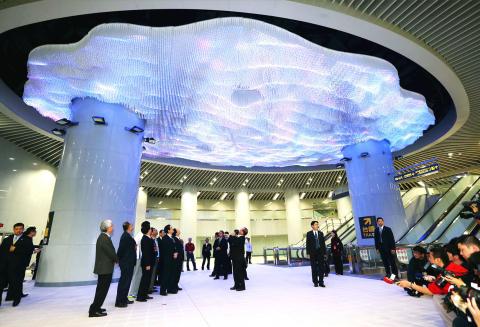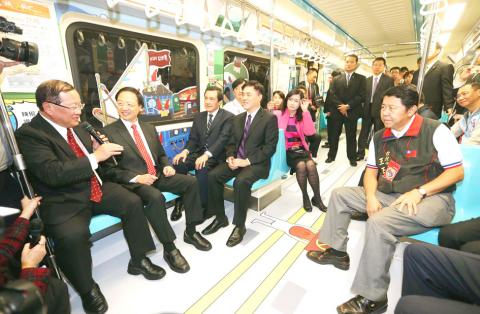The Taipei MRT’s newly completed Songshan Line is an important addition to the capital’s transportation network, as it provides more transfer options, Taipei Mayor Hau Lung-bin (郝龍斌) said at the line’s inauguration ceremony yesterday.
Under construction since 2006, the line was originally scheduled to open last year, but was held up by the discovery of a Qing Dynasty-period archeological site near the line’s Beimen Station, Taipei’s Department of Rapid Transit Systems said.
President Ma Ying-jeou (馬英九), Hau and other dignitaries yesterday toured displays of the discovered artifacts within Beimen Station, before stepping into an MRT train for a ride to the line’s Songshan terminal station.

Photo: CNA
“To maximize the ease of transferring between lines, Taipei’s MRT system was designed around three horizontal and vertical lines, with Songshan the final horizontal line,” Hau said, adding that with the opening, the city’s core MRT network is now completed.
With the exception of the airport MRT line being constructed by the Taiwan High Speed Rail Corp (台灣高鐵) to connect Taipei Main Station to Taiwan Taoyuan International Airport, all new lines called for in city plans would boast only a “medium level” passenger capacity, a step below the “high level” capacity of most of Taipei’s current lines, the department said.
Meanwhile, Hau clarified earlier remarks suggesting that Taipei independent mayoral candidate Ko Wen-je (柯文哲) winning the Nov. 29 election would lead to chaos in plans for the development of Greater Taipei’s public transportation system.

Photo: CNA
Hau, a member of the Chinese Nationalist Party (KMT), said that a non-KMT mayor might have trouble communicating effectively with the mayors of New Taipei City and Keelung, calling on all candidates to state clearly their position on planned future MRT lines linking the three cities.
The Songshan Line is an extension of the Xindian Line, running through eight stations, most of them parallel to Nanjing E Road: Ximen, Beimen, Zhongshan, Songjiang Nanjing, Nanjing Fuxing, Taipei Arena, Nanjing Sanmin and Songshan.
With the opening of the extension, trains will no longer run directly between the Xindian and Tamsui stations.
Four stations along the line connect with other MRT lines: Ximen to the Bannan Line, Zhongshan Station to the Tamsui-Xinyi Line, Songjiang Nanjing Station to the Zhonghe-Xinlu Line, the newly renamed Nanjing Fuxing Station (formerly Nanjing East Road Station) to the Wenhu Line, as well as Songshan Station to the Taiwan Railways Administration’s Songshan Station.
The Songshan Line is to start service at 6am today, allowing free travel for EasyCard holders for one month, the Taipei City government said.
Additional reporting by CNA

AGING: As of last month, people aged 65 or older accounted for 20.06 percent of the total population and the number of couples who got married fell by 18,685 from 2024 Taiwan has surpassed South Korea as the country least willing to have children, with an annual crude birthrate of 4.62 per 1,000 people, Ministry of the Interior data showed yesterday. The nation was previously ranked the second-lowest country in terms of total fertility rate, or the average number of children a woman has in her lifetime. However, South Korea’s fertility rate began to recover from 2023, with total fertility rate rising from 0.72 and estimated to reach 0.82 to 0.85 by last year, and the crude birthrate projected at 6.7 per 1,000 people. Japan’s crude birthrate was projected to fall below six,

US President Donald Trump in an interview with the New York Times published on Thursday said that “it’s up to” Chinese President Xi Jinping (習近平) what China does on Taiwan, but that he would be “very unhappy” with a change in the “status quo.” “He [Xi] considers it to be a part of China, and that’s up to him what he’s going to be doing, but I’ve expressed to him that I would be very unhappy if he did that, and I don’t think he’ll do that. I hope he doesn’t do that,” Trump said. Trump made the comments in the context

SELF-DEFENSE: Tokyo has accelerated its spending goal and its defense minister said the nation needs to discuss whether it should develop nuclear-powered submarines China is ramping up objections to what it sees as Japan’s desire to acquire nuclear weapons, despite Tokyo’s longstanding renunciation of such arms, deepening another fissure in the two neighbors’ increasingly tense ties. In what appears to be a concerted effort, China’s foreign and defense ministries issued statements on Thursday condemning alleged remilitarism efforts by Tokyo. The remarks came as two of the country’s top think tanks jointly issued a 29-page report framing actions by “right-wing forces” in Japan as posing a “serious threat” to world peace. While that report did not define “right-wing forces,” the Chinese Ministry of Foreign Affairs was

PREPAREDNESS: Given the difficulty of importing ammunition during wartime, the Ministry of National Defense said it would prioritize ‘coproduction’ partnerships A newly formed unit of the Marine Corps tasked with land-based security operations has recently replaced its aging, domestically produced rifles with more advanced, US-made M4A1 rifles, a source said yesterday. The unnamed source familiar with the matter said the First Security Battalion of the Marine Corps’ Air Defense and Base Guard Group has replaced its older T65K2 rifles, which have been in service since the late 1980s, with the newly received M4A1s. The source did not say exactly when the upgrade took place or how many M4A1s were issued to the battalion. The confirmation came after Chinese-language media reported